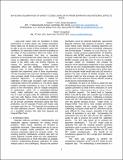Bayesian Calibration of Safety Codes Using Data from Separate-and Integral Effects Tests
Author(s)
Youngblood, Robert; Yurko, Joseph P; Buongiorno, Jacopo
DownloadBuongiorno_Bayesian calibration.pdf (743.3Kb)
OPEN_ACCESS_POLICY
Open Access Policy
Creative Commons Attribution-Noncommercial-Share Alike
Terms of use
Metadata
Show full item recordAbstract
Large-scale system codes for simulation of safety performance of nuclear plants may contain parameters whose values are not known very accurately. In order to be able to use the results of these simulation codes with confidence, it is important to learn how the uncertainty on the values of these parameters affects the output of the codes. New information from tests or operating experience is incorporated into safety codes by a process known as calibration, which reduces uncertainty in the
output of the safety code, and thereby improves its support for decision-making. Modern analysis capabilities afford very significant improvements on classical ways of doing calibration, and the work reported here implements some of those improvements. The key innovation has come from development of safety code surrogate model (code emulator) construction and prediction algorithms. A surrogate is needed for calibration of plant-scale simulation codes because the multivariate nature of the problem (i.e., the need to adjust multiple uncertain parameters at once to fit multiple pieces of new information) calls for multiple evaluations of performance, which, for a computation-intensive model, makes calibration very computation-intensive. Use of a fast surrogate makes the calibration processes used here with Markov Chain Monte Carlo (MCMC) sampling feasible. Moreover, most traditional surrogates do not provide uncertainty information along with their predictions, but the Gaussian Process (GP) based code surrogates used here do. This improves the soundness of the code calibration process. Results are demonstrated on a simplified scenario with data from Separate and Integral Effect Tests.
Date issued
2015-04Department
Massachusetts Institute of Technology. Department of Nuclear Science and EngineeringJournal
Proceedings of the International Meeting on Probabilistic Assessment and Analysis (PSA 2015)
Publisher
American Nuclear Society
Citation
Yurko, Joseph P., Jacopo Buongiorno, and Robert Youngblood. "Bayesian Calibration of Safety Codes Using Data from Separate-And Integral Effects Tests." Proceedings of the International Meeting on Probabilistic Assessment and Analysis (PSA 2015), Sun Valley, Idaho, USA, 26-30 April 2015. Vol. 1. American Nuclear Society, 2015, pp. 718-727.
Version: Author's final manuscript
ISBN
978-0-89448-721-7